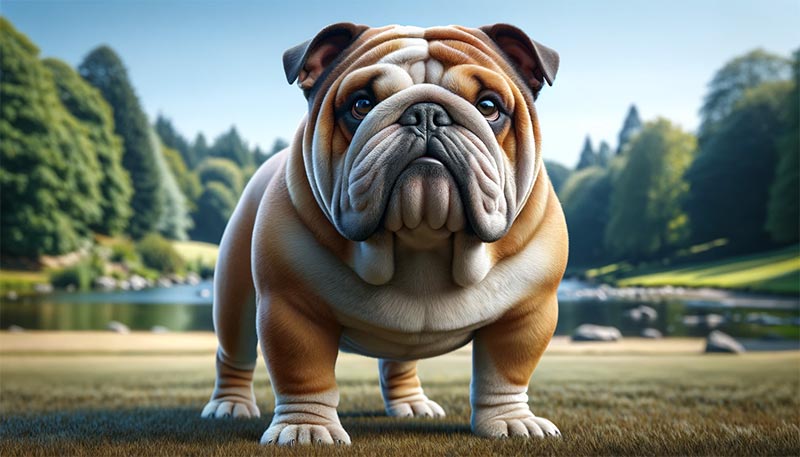The Bulldog, often recognized by its distinctive wrinkled face and stocky build, is a breed that exudes a remarkable blend of dignity and friendliness. Originating in England, these dogs have evolved from their ancient ancestors, known for bull-baiting, into gentle, affectionate companions.
In this blog post, we delve into the myriad characteristics of Bulldogs, revealing what makes them such a cherished breed.
Physical Attributes
1. Appearance: Bulldogs are medium-sized dogs with a muscular, hefty build. They possess a characteristic wrinkled face and a distinctive pushed-in nose. Their loose, saggy skin, especially around the face, adds to their unique charm.
2. Size: Typically, Bulldogs weigh between 40 to 50 pounds. Despite their compact size, they are known for their impressive strength.
3. Coat and Colors: Bulldogs have a short, smooth coat that comes in various colors and patterns. Common colors include white, fawn, brindle, or a mix of these.
4. Lifespan: The average lifespan of a Bulldog is about 8 to 10 years. While robust, they are prone to certain health issues that can impact their lifespan.
Temperament
5. Nature: Bulldogs are known for their calm, courageous, and friendly nature. They tend to form strong bonds with their families and are particularly good with children.
6. Behavior: Despite their somewhat intimidating appearance, Bulldogs are incredibly affectionate and gentle. They are also known for being quite stubborn, which can be a charming trait with the right training approach.
7. Intelligence and Trainability: Bulldogs are intelligent but can be a bit willful. Training them requires patience and consistency, but they respond well to positive reinforcement techniques.
Health and Care
8. General Health: Bulldogs are prone to certain health issues, such as respiratory problems, hip dysplasia, and skin infections. Regular veterinary check-ups are crucial for early detection and management of these conditions.
9. Exercise Needs: They require moderate exercise to maintain their health. Daily walks and playtime are sufficient to keep them in good shape.
10. Grooming: Due to their wrinkled skin, Bulldogs need regular grooming to keep their skin clean and healthy. Their short coat requires minimal grooming, but they do benefit from regular brushing.
Bulldogs in Family Life
11. Compatibility with Children: Bulldogs are excellent with children – patient, gentle, and often protective. However, interactions should always be supervised, especially with younger children.
12. Interaction with Other Pets: They generally get along well with other pets, especially if they are raised together. Bulldogs can be a bit territorial, so proper introductions are important.
Final Thoughts
Bulldogs are much more than their distinctive appearance. Their calm demeanor, loyalty, and affectionate nature make them wonderful family pets. While they do have specific health needs and require a bit of patience when it comes to training, the rewards of having a Bulldog are immeasurable.
They are not just pets; they are loyal companions, ready to offer unconditional love and a few laughs along the way with their unique personalities and endearing quirks.
FAQs on Bulldogs Characteristics
Q: How well do Bulldogs adapt to apartment living?
A: Bulldogs are well-suited for apartment living due to their moderate exercise needs and generally calm nature. They do not require a large yard and are content with short daily walks and some indoor play.
Q: Do Bulldogs drool a lot?
A: Yes, Bulldogs are known to drool, especially after eating or drinking, or when they are overheated. Keeping a cloth handy and regular face cleaning can help manage this.
Q: Are Bulldogs good for first-time dog owners?
A: Bulldogs can be a good choice for first-time dog owners due to their easygoing nature. However, potential owners should be aware of their health needs and the commitment required for their care and training.
Q: How much does a Bulldog typically cost?
A: The cost of a Bulldog can vary greatly depending on the breeder, location, and pedigree. Typically, Bulldogs can range from $1,500 to $4,000. Prospective owners should also factor in the cost of veterinary care, food, and other supplies.
Q: Can Bulldogs handle cold or hot weather?
A: Bulldogs are sensitive to extreme temperatures. They can handle mild cold with proper care, but extreme heat can be dangerous due to their breathing issues. It’s important to keep them cool and hydrated in hot weather.
Q: How are Bulldogs with strangers?
A: Bulldogs are usually friendly with strangers, though they can be initially cautious. They are not typically aggressive but will show loyalty and protectiveness towards their family if they sense a threat.
Q: Do Bulldogs bark a lot?
A: Bulldogs are not known to be excessive barkers. They may bark to alert their owners of something unusual but generally, they are relatively quiet.
Q: Is it difficult to train a Bulldog?
A: Training a Bulldog can be challenging due to their stubborn nature. However, with patience, consistency, and positive reinforcement, Bulldogs can be well-trained. Early socialization and obedience training are recommended.
Q: Are Bulldogs good swimmers?
A: Bulldogs are not natural swimmers. Due to their heavy build and short snouts, they can have difficulty swimming and should always be closely supervised around water.



